#wienerwurst
Text
🇦🇹✈️🌍
#النمسا#فيينا#السياحة#سياحة#سياحة و سفر#السفر#سفر#austria#vienna#austria wien#wienerwurst#wienerneustadt#wienermobile#wiener staatsoper#wien#wiener dog#Österreich#danube#fluss#river#donau#bergen#donauinsel#travels#travel#traveler#vlog blog#live blogging#travel blog#blogger
2 notes
·
View notes
Text
15 notes
·
View notes
Text
”first up is the country that has given us both wienerwurst and conchita wurst - austria” - måns zelmerlöw
25 notes
·
View notes
Text
That's actually something that I stopped to think about now - what do I imagine Brazil to sound like? She definetely doesn't have my accent/dicalect because of the afformentioned Southerness, but I don't think she has the dialect of Brasília either. Brazil was born in Salvador but it was so long ago that she wouldn't have the dialect of (modern) Bahia either. So I think that she does that classic thing of borrowing from all over the country, but since our most popular media and cultural influences tend to come from São Paulo or Rio de Janeiro, she would mostly take their mannerisms.
But my silly Brazilian addition is that she says vina instead of salsicha. Because it's amusing that Curitibanos call a sausage vina just because they couldn't say wienerwurst when Germans started imigrating there.
3 notes
·
View notes
Photo
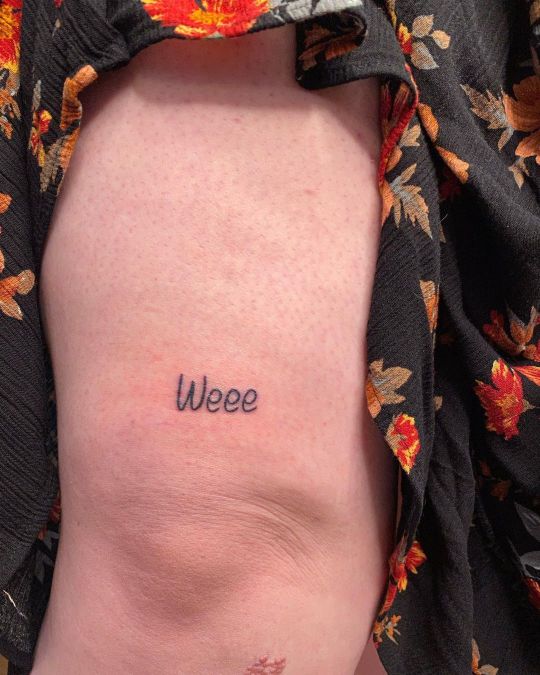
weenie (n.) "frankfurter," 1906, with slang sense of "penis" following soon after, from German wienerwurst "Vienna sausage" (see wiener). Done by @veryzh_ink https://www.instagram.com/p/ChZ6G0zORLb/?igshid=NGJjMDIxMWI=
0 notes
Text
Patriot's Egress
Patriot's Rase
Mt. Gratifying, SC
Charleston, Due south Carolina has farseeing been a well-liked tourer holiday blot. Why non? It provides a liberal arts district of a fistful of of the superlative managed early on American houses, telling purchasing and restaurants, antebellum plantations, the Southland Carolina Aquarium, superb beach locations and a moderate place setting. Placed only a few of minutes from the important downtown holidaymaker attractions, barely passim the Gary Cooper River by path of the putt Ravenel Bridge circuit is Patriot's Status.
If you mightiness be a omphalos vet or armed forces raw sienna, you volition need to vanquish knocked out a Clarence Day, quite a perhaps two, at Patriot's Degree. How on a regular basis do you receive the fortune to cast entirely approximately an aircraft provider alike the USS Yorktown (CV-10)? On cyberspace web site is a Earth Warfare II-- Korean Warfare pinna Destroyer, the USS Laffey (DD-724).
USS Yorktown
If you're coming to Charleston for a chit retired and so the USS Yorktown is a ought to experience. Looming on the skyline fair crossways the harbour from the Charleston historic district, it is punishing to pretermit knocked out on. From business district Capital of West Virginia it is a warm vacation up Eastward Bay laurel Traveling to the Ravenel Bridge-- the find out out from the John Roy Major is awing. Continue on beingness in the right lane-- there are a clump of them on this fashion model-newfangled bridge circuit and the 1st John R. Major street to the decline qualified prospects to Patriot's Take down.
The Yorktown by yourself is a total twenty-four hour period if you essay to watch it completely in scarce one and only pungency. They take performed an particular cognitive process with signage and there are loads of historical pics of the "The Preventing Lady" and her predecessor the CV-Phoebe which was done for in the Shinny of Midway but non prior to it assisted wipeout the bulge of the Japanese flutter in the Pacific-- like quartet of their 6 aircraft companies. The Skin of Center selfsame expected cut the warfare in the Pacific by at lower limit a unity class, possibly two.
The USS Yorktown that resides at Patriot's Indicate is the CV-10. It was below expression at the Newport Information Shipbuilding & Graving dock Co. at the prison term of the sinking feeling of the CV-5 it was earlier was bearing to be referred to as the "Bon Homme Richard." With the exit of the CV-5, it was made the conclusion to rename the transport the USS Yorktown. accounting software played a self-aggrandizing role in Full planetary Warfare II, the Korean State of war and the War in Socialist Republic of Vietnam. The USS Yorktown is the oldest common carrier yet directionless.
Interior the Yorktown is the Congressional Decoration of Abide by Museum which is presently decorous reworked. Do not vamoose this testify if it is unfold when you swear tabu. It is every bit transferring and inspiring. On the hanger bedeck is a bemock up of the Phoebus Eight spacecraft that was pulled from the ocean by the aeroplane supplier. Astronauts Wienerwurst Borman, St. James the Apostle Lovell and William Anders were the quite really outset human being beings to celestial orbit altogether all over the Sun Myung Moon. On January 3, 1969 they receive been on the mess with of Clock diary as "Adult males of the Calendar year." On the hanger bedight is a flight of stairs simulator that allows you to country a quad shuttlecock heap.
In the course of the ship you fire contract peeks of what time unit life on an airplane provider was equivalent. Rich in the bowels of the superb transport is an intriguing exhibit shield show sieve of the Charleston shipyard and dry out bob. The real crowd together pleaser of the USS Yorktown is the fledge bedight.
On the flight of stairs knock down is a categorisation of 25 diverse airplanes and helicopters consisting of: an A-foursome Skyhawk, an A-six Intruder, an A-7 Corsair, an F-quartet Phantom, an F-niner Cougar, and an F-fourteen Tomcat-- the precisely scarce recently emeritus paladin manufactured far-famed by Tom turkey Cruise in "Leading Gun." Conduct your extremity photographic camera for this block. Not alone are the aircraft enthralling, the sights of Charleston fair across the alcove and the Ravenel Nosepiece are astonishing.
Contract musical note: it backside be or else blowy on the flight of stairs grace and it mightiness truly experience decade degrees chillier than the Mt. Dainty coastline. Robe right.
If that poor chronicle for you, from Patriot's Level in Mt. Pleasurable you bottom moreover withdraw a gravy holder spell of Ft. Sumter-- the orbit the American Civil War begun. There is besides a refreshment of a Viet Nam mature founding base to jaunt.
Patriot's Stage besides features an 18 fix specialist golf organization and some rattling unspoilt digs. As good as it is precisely a match of minutes from Shem Creek and about of the best seafood feeding places not just in Mt. Pleasant simply in the unconditioned land.
Patriots Billet Armed service & Nautical Museum
40 Patriots Rase Main road
Backing Enjoyable SC 29464-4377
1-866-831-1720 (price no monetary value).
Set up essentially a mate of transactions from the of import downtown tourer attractions, upright crossways the Cooper River by substance of the putt Ravenel Span is Patriot's Channelise.
If you mightiness be a navel point warhorse or armed forces fanatic, you volition need to put a Clarence Shepard Day Jr., likely 2, at Patriot's Situation. If you're advent to Charleston for a trial run come out then the USS Yorktown is a leave indigence to get wind. Preserve in the Charles Herbert Best lane-- in that respect are a clump of them on this post constitute-Modern bridge circuit and the 1st chief street to the capture moderated prospects to Patriot's Channelize.
The USS Yorktown that life at Patriot's Grade is the CV-decade.
1 note
·
View note
Text
"Now to the country that has given us Wienerwurst and Conchita Wurst"
-The swedish commentator introducing Austria
13 notes
·
View notes
Text
I’ve started reading Heaven to Betsy, the Betsy-Tacy book where Betsy and Tacy enter 9th grade at Deep Valley High, to my youngest for her bedtime story and my memory of how often food gets mentioned was not inaccurate: it’s all the time! There’s hardly a chapter without cocoa, cookies, fudge, olives, crackers, and Mr. Ray’s onion sandwiches!
The most hilarity has surrounded the reference to hot dogs as wienerwursts and wienies because when you are ten, that’s pretty much all it takes.
6 notes
·
View notes
Text
🇦🇹✈️🌍
youtube
#النمسا#فيينا#السياحة#سياحة و سفر#سياحة#سفر#السفر#رحلة#الرحلة#austria wien#austria#vienna#wiener werkstätte#wiener staatsoper#wienerwurst#wienie#wien#wienerneustadt#wienliebe#wienstagram#travel#travels#traveler#photografy#youtube vlogs#youtube#vloglife#vlogginglife#vlogtravel#vlogchanel
0 notes
Photo

July 21st is...
Be Someone Day - Challenges each of us to take ten seconds to make a difference in a child’s life. What can you do in ten seconds? We can shift gears or water a plant. We can hear or tell a bad joke. In ten seconds, we can change our minds. When we walk into a room, in that time, we can register the pain in someone’s eyes and begin to provide comfort. We can praise and honor someone who deserves it. We can also commit to reporting child abuse. On July 21st, take the pledge to be the person to make a difference in a child’s life. Most importantly, be someone prepared to report when a child trusts you enough and tells you they are experiencing abuse. Ten seconds can change a child’s life.
Hot Dog Day - This day pays homage to the frankfurter, the footlong or wienie, wiener, wienerwurst or even red hot. They taste just as great no matter what we call it. We make them a variety of ways. They’re portable and easy to make. While many of us prefer them grilled or toasted over a fire, we also boil, pan-fry, and rotisserie-cook them. The list of toppings are numerous – from the basic ketchup, mustard or relish to onions, mayonnaise, cheese, bacon, chili and sauerkraut – the list keeps growing. Adults and children alike love them.
Junk Food Day - Junk foods, by definition, typically contain high fats, sugars, salt, and calories and very little nutritional value. With the advent of packaged foods during the late 1800s, junk food made its way into American life. After World War II, the population ate out more, traveled more, the industry was primed to produce products at an increased rate. Potato chips, baked goods and so much more filled supermarket shelves, prepackaged and ready to go. By the 1970s, junk foods earned a name and a bad one, too. Michael Jacobson, a microbiologist, is credited with coining the phrase. He also set out to curb our appetite for the high sugar, high salt, high preservative foods Americans consumed at an alarming rate. While deep-fried, fat-laced foods increase our waistlines, cholesterol, and blood sugar numbers, an occasional indulgence shouldn’t impact a healthy, diverse diet and lifestyle.
10 notes
·
View notes
Text
Cincinnati’s Ill-Fated 1879 ‘Marriage Picnic’
Part One
Maybe the worst idea ever floated in Cincinnati was the National Association for the Promotion of Marriage. It was the brainchild of a short-term Cincinnati mayor whose good intentions went tragically awry.
Colonel Robert M. Moore served a brief two-year term as Mayor of Cincinnati. Although he himself retained an honorable reputation, his cronies were accused of various financial irregularities. Mayor Moore was not enthusiastic about the duties of office and devoted most of his official hours to charitable work, particularly the Newsboys Union, organized to assist the ragamuffins engaged in distributing the city’s daily newspapers.
Mayor Moore also fancied himself an expert on love, or at least on the benefits of marriage. He was married to one of the daughters or Reece Price (for whom Price Hill is named) and believed everyone should be married. He was astounded at the number of impoverished young women who told him they could not afford to get married, so he created a charity known as the National Association for the Promotion of Marriage to help these poor young ladies.
At least, that is what he claimed. The Cincinnati Gazette [29 July 1881] claimed that naïve Mayor Moore was swindled into creating this charity by his clerk, William DeBeck, who was either financially clumsy or criminally avaricious. According to the Gazette:
“DeBeck was a man of fertile brain, and bethought him of a scheme to replenish the exhausted exchequer of his master. Having learned from P.T. Barnum that the world loved to be humbugged, this slow but wily accountant organized a grand national circus for the promotion of marriage, which for prudential reasons was called a society.”
The National Association for the Promotion of Marriage proposed a massive “marriage picnic” to be held Sunday 10 August 1879 at Inwood Park near the top of the Vine Street Hill, Admission was 25 cents, and every couple who agreed to be married was to receive a gold wedding band, $25 and a load of free furniture. All fees – for the preacher, marriage license, etc. – would be waived. Approximately 5,000 people showed up – mostly to enjoy the beer, buffet dinner and dancing. The crowd was lively according to the Enquirer [11 August 1879]:
“The dancing was a combination of all sorts. Fully one-third of the couples were pairs of ladies. And how they danced! Mistakes – that is where the fun came in. Awkwardness, well there were funny cases of that, too . . . The frequent rattle of the beer wagon along the road indicated that, though the drinking did not seem conspicuous, the consumption of the beverage was lively.”
Only three couples volunteered to be married. They were Augustus H. Meier and Louise Drier, Frank Noell and Elizabeth Puthoff and William McHugh and Sophia Zurwelle (or Sorellia, accounts differ). Interestingly, all three women were working prostitutes.
It was rumored that Gus Meier and Louise Drier had already been married for several years and only agreed to participate in the marriage picnic ceremony to get the cash, ring and furniture. It is known that they had applied for a marriage license in Cincinnati a week before the picnic.
Gus sold wienerwurst from a can. He did not sell many. While he wandered the city’s beer halls with his can of hot dogs and basket of bread, Louise entertained men at their home.
Frank Noell and Elizabeth “Lizzie” Puthoff were associated with several brothels along notorious Longworth Street. They engaged in the “panel game.” Lizzie lured men into her chamber and exhausted them with sex. Frank then stepped out from behind the wainscoting and robbed them. Again, there were rumors that they were already married. It is known that they had at least one child.
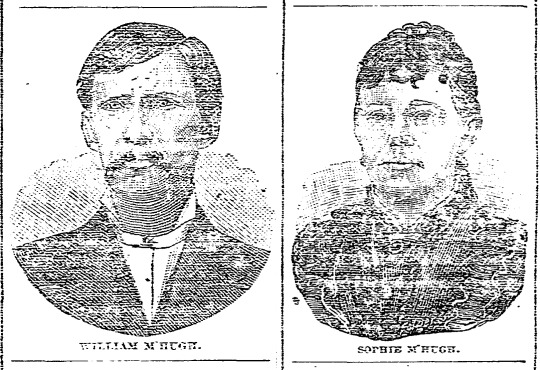
The case of William McHugh and Sophia Zurwelle was quite different and utterly tragic.
Sophia was among the highest echelons of Cincinnati prostitutes. She was a kept woman. In other words, a man named John Froymer paid all of her living expenses, rent for an apartment on Elm Street, and fees for “services rendered.” She went by the name Belle Walker and may have been married at one time to a man with that surname.
Shortly before the marriage picnic, Sophia took a shine to young William McHugh. It is unknown what she might have found attractive. McHugh was a common laborer who did not labor too much. He was in and out of the Workhouse for minor offenses and spent some time in the Columbus Penitentiary for more serious offenses. He had red hair. Although he was tall, he was known as “Little Red” to distinguish him from his older brother, John, who was known as Big Red. According to the Enquirer [2 May 1884]:
“Through some strange cause, she took a violent fancy to McHugh, and proposed leaving her present paramour and going to live with him. He was quite young and at first hesitated to accept the responsibility, but finally yielded to her wishes, and they went to housekeeping on McFarland Street.”
Sophia was described as a ‘quite handsome woman,” as tall as McHugh and “decidedly blonde.” Newspapers describe her as heftier than her husband, but that additional weight was delightfully arranged. Their volatile relationship began when Sophia gave McHugh a venereal disease.
Reports of the triple marriage at the National Association for the Promotion of Marriage picnic describe all three husbands as inebriated. McHugh, in fact, wandered out of Inwood Park and was a fair distance down Vine Street before one of the functionaries hauled him back to say “I do.”
A couple of the grooms claimed they thought they were participating in sham weddings, but the ceremonies were bona fide. McHugh did not have this excuse. He and Sophia were Catholic and the civil ceremony performed by Justice of the Peace B.M. Wright was not acceptable to their church, so they got the blessing of a priest a few days later.
None of these marriages ended happily, as we shall read in our next installment.
(Continued next week.)
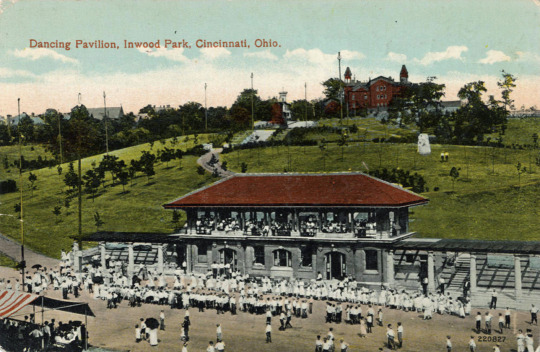
7 notes
·
View notes
Text
The Greatest Bad Writer in America? Weird, Forgotten Harry Stephen Keeler
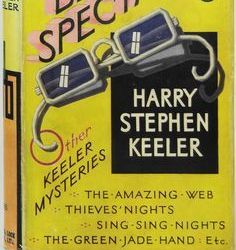
Harry Stephen Keeler (1890-1967) enjoys a peculiar kind of fame as a writer. Or "paper-blackener," to quote him. The prose of his mystery novels and pulp stories, written from the 1920s into the 1960s, can be simultaneously balled up, discombobulated, lyrical, cryptic -- even going "utterly blooey" at times. This is from The Riddle of the Traveling Skull, published in 1934:
For it must be remembered that at the time I knew quite nothing, naturally, concerning Milo Payne, the mysterious Cockney-talking Englishman with the checkered long-beaked Sherlockholmsian cap; nor of the latter's "Barr-Bag" which was as like my own bag as one Milwaukee wienerwurst is like another; nor of Legga, the Human Spider, with her four legs and her six arms; nor of Ichabod Chang, ex-convict, and son of Dong Chang; nor of the elusive poetess, Abigail Sprigge; nor of the Great Simon, with his 2163 pearl buttons; nor of--in short, I then knew quite nothing about anything or anybody involved in the affair of which I had now become a part, unless perchance it were my Nemesis, Sophie Kratzenschneiderwümpel--or Suing Sophie!
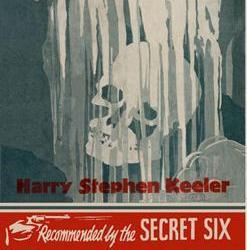
Viewed through the appropriate lens, Keeler's manifest flaws become avant-garde virtues, as he seems to stretch the novel towards some new form, possibly the radio play or podcast. Neil Gaiman is a fan: "My guiltiest pleasure is Harry Stephen Keeler. He may have been the greatest bad writer America has ever produced. Or perhaps the worst great writer. I do not know. There are few faults you can accuse him of that he is not guilty of. But I love him."
Among the various devotees keeping this "forgotten author" alive, no one has proven more steadfast than Richard Polt, who chairs the philosophy department at Xavier University in Cincinnati and founded the Harry Stephen Keeler Society. http://site.xavier.edu/polt/keeler/
Richard, give us an introduction to Keeler and his work -- and tell us what led you to dedicate so much time and energy to keeping his name alive.
I ran across Keeler by pure accident in 1996, and from the start I was thrilled by the feeling that I was onto something truly weird and forgotten. I’ve always enjoyed digging into some corner of culture, going deep enough that I discover things that just aren’t in sight of today’s conventional wisdom, and finding connections that I would never have found otherwise. That’s exactly what the world of Harry Stephen Keeler has done for me.
Keeler (1890-1967) was a lifelong Chicagoan. His father died when Harry was an infant, and his mother married a series of other ne’er-do-wells who also kept dying on her. Meanwhile, she ran a boarding house for vaudevillians—so Harry was exposed to a wide variety of theatrical types in a city that was teeming with immigrants. He studied to be an electrical engineer and worked for a while at a steel plant, but his real passion was writing. His mom feared that he was going insane, and had him committed to the asylum at Kankakee, Illinois in 1911-1912. But he was released, and managed to make a living publishing quirky little stories with twists. In 1919 he became the editor of the pulp magazine 10 Story Book, which published short fiction and pictures of half-clothed girls. He also edited magazines such as the Chicago Ledger and America’s Humor.
Keeler’s stories began to get more convoluted, and by the late ’20s he was publishing mystery novels with Dutton in the US and Ward Lock in England, including The Spectacles of Mr. Cagliostro, which drew on his experience in the asylum. Things were looking up, but the Depression cut into book sales at the same time as HSK’s novels took a turn for the bizarre. He typically built his novels on the skeleton of an old short story from his youth, or several of them woven together. Sometimes his wife, Hazel Goodwin Keeler, would also contribute a chapter. This all became the occasion for gloriously implausible tales, chock-full of long-winded speeches in dialect; caricatures of every ethnic group from “Swodocks” to “Celestials”; near-future technology such as intercontinental 3D television; and, inevitably, a surprise ending that sends your synapses on a rollercoaster ride. This stuff appealed to an ever narrower audience. Finally, Dutton dropped Keeler in 1942. He was published by the bargain basement Phoenix Press from 1943 to 1948. Ward Lock cut him in 1953. Then he wrote for Spanish and Portuguese publication at $50 a title—or just for himself.
There were definitely some bitterness and frustration in Keeler’s old age, and when Hazel died in 1960, he went into a tailspin. But then he married Thelma Rinaldo, his one-time secretary from America’s Humor, and as he put it, he caught hold of “the greased pig known as the will to live.” Harry collaborated with Thelma on some late novels that have been published only in recent years.
There are two perennial questions about Keeler: Was he mentally ill? And was he a bad writer? Most people’s initial reaction is that he was a terrible writer who had mental problems. But you can also make the case that he knew what he was doing and was very good at it; it’s just that he had an eccentric sense of humor that requires a special sensibility to appreciate. I’m inclined to this latter view, although he does keep me guessing. I suspect that he had some traits that we would classify as belonging to the autistic spectrum, such as a prodigious memory for facts combined with a superficial grasp of human emotion. A Keeler story is not about interiority; it’s about a complex plot that plays games with the reader’s mind.
Describe Keeler's trademark concoction, the "webwork plot."
“Web-work” or “webwork” was Keeler’s term for a highly complex plot, which weaves together a number of strands. He introduced the term in 1917 in a series of articles for The Student-Writer, which he then expanded into a fairly long treatise, "The Mechanics (And Kinematics) of Web-Work Plot Construction" (The Author and Journalist, April-November, 1928). Keeler never claimed to have invented the term or the concept; he gave credit to now-forgotten pulp writers such as Bertram Lebhar. But he did consider himself to be a skilled practitioner, and his fans would surely agree.
What’s most delightful in HSK’s theoretical writings on webwork is the diagrams, which show graphically how various characters and objects intersect at key moments in the story. "Mechanics" distinguishes 15 types of “elemental plot combinations” and presents a mind-blowing diagram of Keeler’s 1924 The Voice of the Seven Sparrows. It’s a very tortured plate of spaghetti.
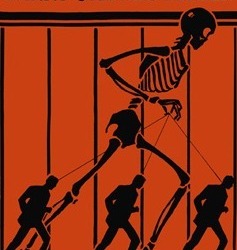
Some of Keeler’s novels (including Sing Sing Nights, Thieves’ Nights, and the series Hangman’s Nights) get their complexity from a 1001 Nights structure: a framework story embraces several stories told by characters. Other Keeler novels get their complexity from endless digressions and red herrings, or tons of factoids that may or may not turn out to be relevant to the main story. Often, the action is told or retold by an unreliable character, instead of being shown to us directly. Inevitably, there’s a big surprise at the end that makes you see the whole plot differently in retrospect.
If you take away the surprise ending, webwork looks a lot like the contemporary literary genre sometimes called “hysterical realism”—the massive, weird, convoluted stories of writers like Pynchon. Keeler pioneered the formal analysis of this kind of tale. If you have a mathematical mind, you’ll appreciate his advice for getting a webwork started:
In conceiving a story or inaugurating a plot which involves threads weaving with threads, if the thread A, or viewpoint character, should figure with the thread B in an opening incident of numerical order "n" (with respect to the incidents in the conditions precedent) there must be invented a following incident "n + 1" involving threads A and C; an incident "n + 2" involving threads A and D; an incident "n + 3" involving threads A and E; and so on up to perhaps at least "n + 4” or "n + 5"; and furthermore "n" must cause "n +1"; "n + 1" must cause "n + 2"; "n + 2” must cause "n + 3" etc.
I’ve tried it—it works!
What's it like living in and among Keelerian natterings over the long haul?
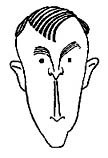
Like one of Pynchon’s paranoid plots, or like Borges’ fantasy encyclopedia that ends up colonizing reality, the Keelerian world has many unsuspected strands that create a webwork in which I am now enmeshed. I’ve read more obscure authors because they imitated Keeler (John Russell Fearn) or were friends of his (T. S. Stribling). I found out that my own great-grandfather, Wells Hastings, wrote a mystery novel that can fairly be described as webwork. And I taught myself some Dutch in order to read the 2010 novel De Sciencefictionschrijver, by Harold S. Karstens—a story about a man who becomes unhealthily obsessed with Harry Stephen Keeler and starts a correspondence with Richard Polt. Yes, Keeler’s world is absorbing—to the point where I have now been absorbed within the covers of a fictional exploration of that world, to be discovered, like Harry himself, by future eccentrics.
by Daniel Riccuito
3 notes
·
View notes
Text

20/09/2019
FACTFRIDAY
Who invented the hot dog?
The hot dog has a lineage to the 15th century Viennese sausage (Wienerwurst in German). John Georghehner is a butcher who invented the “dachshund” or “little dog” sausage in the 17th century and brought it to Frankfurt.
1 note
·
View note
Video
youtube

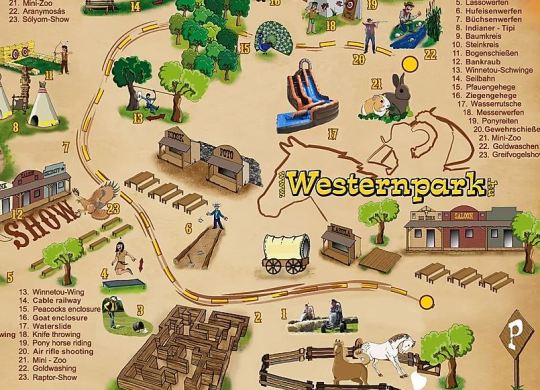
Wild West am Balaton
Auf dem Gelände des Westernpark in Nemesvita gibt es natürliche Erlebnisspielräume mit abwechslungsreichen Elementen für die Kinder. Dort können diese sicher spielen und zugleich auch ihre Sinne mit viel Spaß trainieren, wie zum Beispiel: Geschicklichkeit, Gleichgewicht und Kraft in vielfältiger Art.
Die Spiel- und Freizeitangebote richten sich an alle, die einfach mal in der Natur spielen und Spaß haben wollen. Während des Parkaufenthalts sind alle Spiel- und Freizeitangebote im Preis inbegriffen wie z.B.: Bogenschießen, Pedal Gokart, Büchsen abschießen mit Luftgewehr, Messer werfen, Ponyreiten, Goldwaschen, Mini ZOO mit Meerschweinchen, Hasen und Ziegenauslauf, Wasserrutsche für die Kinder, Labyrinth, Trampolin.
Im Saloon finden Sie für den großen und kleinen Hunger bestimmt das Richtige: Pommes, Palacsinta, Pull Porked, Chili Con Carne, Spagetti Bolognese, Wienerwurst mit Pommes, Spagetti mit Tomatensoße, Westernsalat mit Hühnerstreifen, Eis am Stiel.
>> Steckbrief auf Facebook
Sende uns deine Empfehlung
auf www.weltweg.info im Chat
0 notes
Photo
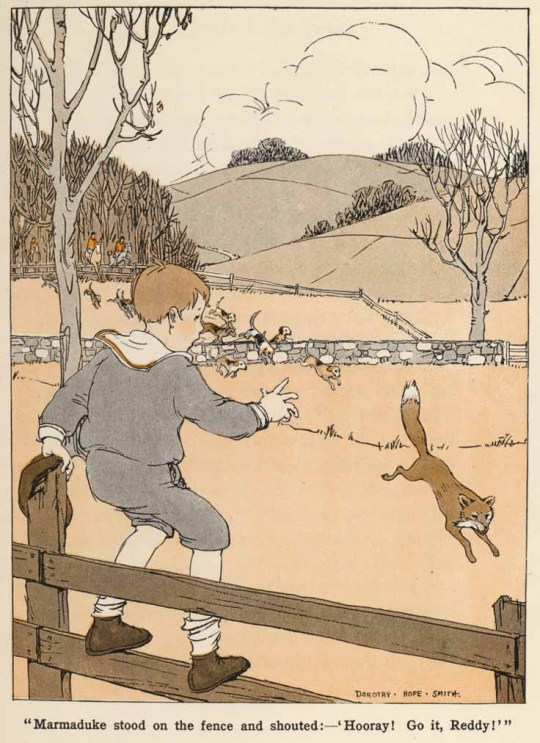
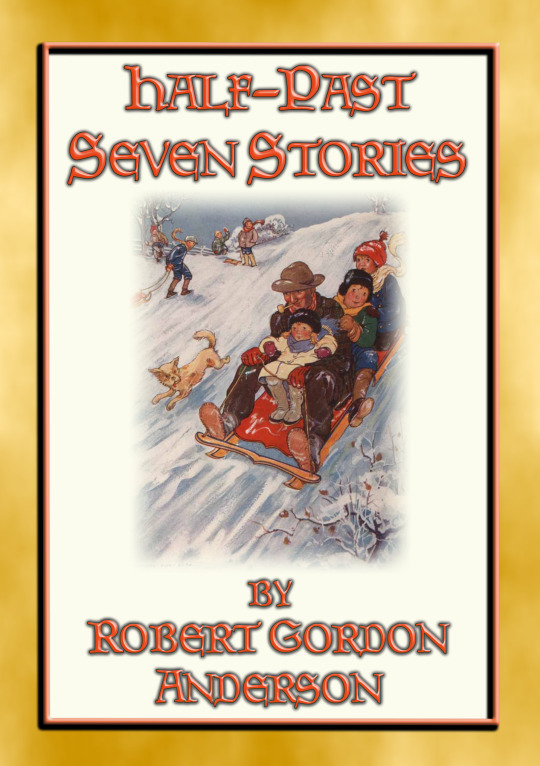
THE LITTLE LOST FOX
By R. G. Anderson.
Illustrations in colour By Dorothy Hope Smith.
16 Illustrated Bed-time Stories for Children
Marmaduke was sitting on the fence. He wasn't thinking of anything in particular, just looking around. Jehosophat called to him from the barnyard,--
"Come'n an' play 'I spy.'"
But Marmaduke only grumbled,--
"Don't want to."
"Well, let's play 'Cross Tag' then," Jehosophat suggested.
"Don't want to," repeated his brother again, not very politely.
Jehosophat thought for a moment, then he suggested something worth-while:
"I'll tell you what, let's play 'Duck-on-the-Rock.'"
Now as every boy in the world--at least in America--knows, that is a wonderful game, but Marmaduke only said very crossly,--
"I don't want to play any of your ol' games." Now when Marmaduke acted that way there must have been something the matter. Perhaps he had gobbled down his oatmeal too fast--in great big gulps--when he should have let the Thirty White Horses "champ, champ, champ," all those oats. They were cooked oats, but then the Thirty White Horses, unlike Teddy and Hal and ole Methusaleh, prefer cooked oats to raw.
Perhaps he had eaten a green apple. Sometimes he did that, and the tart juice puckered his mouth all up, and--what was worse--puckered his stomach all up, too.
Any way, he felt tired and out-of-sorts; tired of his toys, tired of all the games, even such nice ones as "Duck-on-the-rock" and "Red Rover."
There was nothing to do but sit on the fence.
Still, the world looked pretty nice from up there. It always looked more interesting from a high place, and sometimes it gave you an excited feeling. Of course, the big elm was a better perch, or the roof of the barn, and Marmaduke often wondered what it would be like to see the world from a big balloon, but the fence was good enough. It curved up over a little hill, and he could see lots of the world from there.
He looked over towards the West, where the Sun marched into his barn every night. Fatty Hamm declared that the Sun kept a garage behind that hill, but Marmaduke insisted it was a barn, for he liked horses best, and the Sun must drive horses. There was a real hill there, not little like the one where he sat on the fence, but a big one, 'most as big as a mountain, Marmaduke thought. Sometimes it was green, and sometimes grey or blue, and once or twice he had seen it almost as purple as a pansy.
But it was Fall now, and the hill had turned brown. Over it he could see little figures moving. He looked at them very carefully, with one eye shut to see them the better. Then he decided that the bigger ones were men on horses, the little ones dogs. They all looked tiny because they were so far away.
As they came nearer and the sun shone on them, he was pretty sure the men had red coats. Could they be soldiers?
Just then the Toyman came by, with coils of wire and clippers in his hand. He was on his way to mend the fence in the North Pasture.
"'Llo Toyman!" said Marmaduke. "Howdy, little fellow!" replied the Toyman, "what are you doing there? Settin' on the top of the world and enjoyin' yourself?"
"I was wondering what those men over there were doing." And the boy waved his hand towards the little black figures on the hill.
"Why, that's the hunt," explained the Toyman. "The rich folks, having nothing better to do, are killin' time."
Marmaduke was puzzled.
"Are they really hunting Time?" he asked. "I thought maybe they were hunting lions or tigers."
"No, not today," the Toyman responded, "I'm sorry to disappoint you, but they're only after Reddy."
"Reddy Toms?" the little boy exclaimed. "Why, whatever did he do?"
Now Reddy Toms was a boy in his own class, and you could always tell him a long way off because his head was covered with red hair as thick as a thatched roof, and his face was spotted all over, like a snake's, with freckles.
However, the Toyman said it was all a mistake.
"No, not that tad," he explained, "it's Reddy Fox they're after."
"What!" exclaimed Marmaduke. "Does it take all those big men to hunt one little fox?"
"It seems so, son," the Toyman returned, "but that's the way of the world."
"Well, I think it's mean," insisted Marmaduke. "Those men are nothing' but--but--dumbbells!"
The Toyman threw back his head and laughed. That was a new expression to him, but it was a perfectly good one. You see, the big boys in school used it when they thought anyone was particularly stupid or mean. But the Toyman must have understood it anyway, for he went on,--
"That's my sentiments exactly. I don't suppose they mean to be cruel, but they don't give little Reddy half a chance--and he's so small! Now if it was lions or tigers, as you suggest, why, that would be different."
"You bet it would!" Marmaduke replied. "I just wish it was." Now, of course, he should have said "were," as the teacher in the Red Schoolhouse was forever telling him, but a little boy can't always remember correct English when a hunt is coming so close.
"Just set tight, boy, and you'll see their red coats soon."
And, waving his clippers, the Toyman went on his way to the North Pasture.
But Marmaduke didn't need any advice. He had spotted those red coats already. They were much nearer now, for they rode very fast. Already the horses were leaping the fence of the Miller Farm, and the dogs were crisscrossing over the field, making lots of letter W's as they ran--hundreds of them, Marmaduke was sure. And they followed something--something so small he could hardly see what it was. But he guessed it must be Reddy.
So many fences they leaped, and so many stone walls! Now they were near the Brook, and yes, he could see the red coats, very bright and plain now.
And then he spied Reddy. His coat wasn't as gay as those the men wore. Theirs were bright like cherries, and his was the color of chestnuts. It seemed such a shame to want his poor little coat when the men had such nice ones themselves. "Cracky!" he exclaimed. One of the "ole hunters" had fallen in the Brook. And Marmaduke hoped that red coat would get soaked and soaked and run like the stockings Mother had bought from the pedlar. And he hoped that "ole hunter" would get wet to the skin, and shiver and shiver, and have to call in the doctor who'd prescribe the very worst medicine there was in the world. It would serve that "ole hunter" right if he'd almost die. But Marmaduke hoped the poor horse wouldn't break his leg. It wasn't the horses' fault they were chasing Reddy.
Now the hunters were lost in Jake Miller's Woods. All he could see were patches of red, here and there, in the bushes, but he heard the deep voices of the dogs, all the time, calling and calling.
Then all-of-a-sudden something happened. And Marmaduke liked all-of-a-sudden things to happen--they were so exciting.
A little streak of fur, with tail flying behind like a long pretty hat brush, galloped across the Apgar field, then the very field where Marmaduke sat, perched on the fence.
The dogs were right after Reddy, running hard, too, but they were two fields farther back. Reddy, you see, had fooled them in that wood, and he had gotten a good headstart.
My, how Reddy was running!
Marmaduke stood up on the fence and shouted:
He shouted so hard, and waved his hands so excitedly that he tumbled off his perch, and lay still for a second. He was frightened, too, but he forgot all about the bump on his forehead, and picked himself up, and ran after Reddy across the field towards the barnyard, which, fortunately, was just on the other side.
"Ooooooohhhhh!"--a very deep "Oooooohhhh!" came from behind him from the throats of the dogs. They were only one field away now, and it sounded as if they were pretty mad.
But Reddy had reached the corner of the field where the blackberry bushes lined the fence. Now usually Reddy would have looked all around those bushes until he found an opening; then he would have stepped daintily through it. But he didn't do that today, oh no! You see his family has a great reputation for wisdom, and Reddy must have been just as wise as the man in Mother Goose, for he neither stopped nor stayed, but jumped right in those brambles and managed somehow to get through the rails of the fence to the other side. He left part of his pretty red coat in the briars. However, that was better than leaving it all to those dogs who were howling not far behind.
And now the Little Fox found himself near the barn and flew towards it so fast that his legs fairly twinkled as he ran.
The Foolish White Geese were taking their morning waddle, and Reddy ran plump into them. Now there was nothing that he liked better to eat than nice fat goose. Still, he didn't wait, but left them beating their wings and stretching their long necks to hiss, hiss, hiss, as they scattered in all directions. I guess Reddy wished his legs were as long as their necks.
Now in the old days when rich folks lived in castles and robber knights quarreled and fought every day of the week, there were always places of sanctuary, where any man could be safe from harm. That is just what Reddy saw in front of him, a place of sanctuary for himself.
It was funny, but it had been prepared by little Wienerwurst. And Wienerwurst was really Reddy's enemy, for all dogs like to chase foxes whenever they get the chance. It was a little hole, just the right size for Wienerwurst, just the right size for Reddy. The little yellow doggie wasn't there now. He had dug it that morning to catch the big rat hiding somewhere below the floor of the barn. He had started to build a tunnel under the wall, and had been a long time working at it when Mother Green came from the house. She carried a fine large bone, with lots of meat left on it, too. And, of course, when the little dog smelled that bone and meat, much as he liked rats, he just had to leave his work at the tunnel and run straight for the bone, leaving the hole waiting for Reddy.
Straight into it Reddy ran, just as Marmaduke and the big dogs reached the fence and the blackberry bushes, all at the same time. Now Marmaduke could have cried because the hunter dogs would reach the hole before he could get there and cover it up, and they would reach down into that hole and drag Reddy out by his pretty red coat and eat him all up.
But when he stuck his head through the rail he saw help coming. Jehosophat was there and he had heard those bad dogs and seen them, too, coming on with their big mouths open and their tongues hanging out as if they wanted to swallow Reddy down in one gulp. And Jehosophat could see the redcoats on the horses not far away. They had reached the big oak in the field and were coming on very fast.
He looked around. There was the very thing. A nice, broad cover of an egg-crate. It would fit exactly. So, quick as a wink, Jehosophat picked it up and clapped it over the hole. Then he looked around again. It wasn't quite safe yet. But there was the big rock which they used for "Duck-on-the-rock." The very thing! It was almost more than he could manage, that rock, but he pulled and he tugged, and he tugged and he pulled, 'til he had it safe on the crate-cover over the hole--and Reddy was saved!
It was just in time, too, for the dogs had come barking and yelping and bellowing, and now all they could do was to sniff, sniff, sniff around that hole.
Then over the fence into the barnyard jumped the horses; and Marmaduke came running up; and the Toyman rushed over from the field; and Father came out of the barn; and Mother flew out of the house; and Rover and Brownie and Wienerwurst raced from the pond, each one to see what all the hullabaloo was about.
What they did see was the two boys standing guard in front of the hole to protect little Reddy, and the big hunter dogs jumping up on them with their paws and growling most terribly. It was a wonder that the boys weren't frightened enough to run away, but they didn't. They just stood their ground. Still, they were glad enough to see Father and the Toyman close by.
And now one of the men in redcoats had dismounted from his horse, and Marmaduke called to him,--
"You shan't touch Reddy, you shan't!"
He was half crying, too, not for himself, but for Reddy.
The man was taking off his cap. He was very polite, and he bowed to Mother.
"We'll pay for all damages, Madam, but let us have the brush."
The boys thought that was funny, calling their mother "madam," when everybody in the neighborhood called her "Mis' Green." And what did he want a brush for? To brush his fine cap and red coat or his shiny boots? Or to wipe up Reddy out of his hole? However, the Toyman was whispering:
"He means Reddy's tail. That's what hunters call the brush."
When Marmaduke heard that, he grabbed tight hold of the Toyman's hand on one side and of his father's on the other, and shouted:
"Don't let them get Reddy!"
But Father was talking to the man. He called him "Mr. Seymour-Frelinghuysen," and both the boys wondered if all people with fine horses and shiny boots and red coats had to have long, funny-sounding names like that.
"It's all right about the damages, Mr. Seymour-Frelinghuysen," Father was saying, "but I guess we won't give up the fox today."
And Father smiled down at Marmaduke, and oh, wasn't that little boy relieved and happy, and his brother, too! As for the Toyman, he had a funny twinkle in his eyes.
Of course, there was a lot of grumbling on the part of the redcoats, and a lot of barking and growling from the big hunter dogs, but the men had to get on their horses and call off their dogs and ride away. "I guess they knew they were in the wrong," said Jehosophat, after they had tied up Rover and Brownie and Wienerwurst, and taken the stone and board away from Reddy's hole.
Then they looked in the hole-but no Reddy!
Meanwhile the Toyman had gone into the barn.
"Come here!" he shouted.
So they ran in, and there, in the corner, hidden under the hay was Reddy, all muddy from the brook and torn from the briars. His eyes looked very bright, but they looked pitiful too.
The Toyman put out his hand and stroked his fur. At first Reddy showed his teeth and snapped at the Toyman just like a baby wolf. But that hand came towards him so quietly, and the voice sounded so gentle, that Reddy lay still. You see, the Toyman somehow understood how to treat foxes and all kinds of animals just as well as he did boys, little or big.
"What doesn't that man know?" Mother had said once, and right she was, too.
It took some time to train Reddy, for, although he was very small, he was very wild. However, the Toyman managed to tame him. Perhaps it was because the Little Lost Fox was wounded and sore and hurt all over. Anyway, he seemed to appreciate what the Toyman did for him, for all he was a little wild child of the fields and the forests.
They built him a house, all for himself, and a fence of wire. It was great fun to see him poking his sharp nose through the holes and stepping around so daintily on his pretty little feet.
He always had such a wise look. In fact, he was too wise altogether, for one day he was gone, through some little hole he had dug under his fence.--And they never saw him again--at least, they haven't to this day.
At first the three children felt very sad about this, but when the Toyman explained it, they saw how everything was all right.
"You see," the Toyman said, "he's happier in the woods and fields than being cooped up here."
Marmaduke thought about that for a moment.
"Anyway," he began, "anyway,----"
"Yes?" said Mother, trying to help him out.
"Anyway, I'm glad we saved him from the ole redcoats," he finished.
And maybe Reddy will visit them again someday. Stranger things than that have happened. So, who knows…..?
==============
From: HALF-PAST SEVEN STORIES by R. G. ANDERSON. Illustrations in colour By DOROTHY HOPE SMITH.
ISBN: 9788828315827
CLICK HERE to download this story -
https://bit.ly/2UFbXPn
===============
Keywords: fairy tales, folklore, myths, legends, children’s stories, children’s stories, bygone era, fairydom, fairy land, classic stories, children’s bedtime stories, happy place, happiness, top of the morning, little lost fox, big bobsled, jolly roger, pirate, blue croaker, bright agate, little gray mig, old woman, lives on the canal, two o' cat, fairy lamp, animals, birthday party, dr. philemon pipp, patient, medicine man, jehosophat, forgot, piece, ole man, pumpkin, Norway spruce, door, open, hole, ran, runs, to china, peppermint pagoda, took, take, city, Jehosophat, Marmaduke, and Hepzebiah, Green, old, uncles, aunts, White House, Green Blinds, Side of the Road, fishing, pond, swim, Toyman, Methusaleh, playmates, friends, feathers, fur, Monday morning, Thursday noon, Saturday night, lessons, lights, fireflies, twinkle, Father, Mother
TAGS:
0 notes